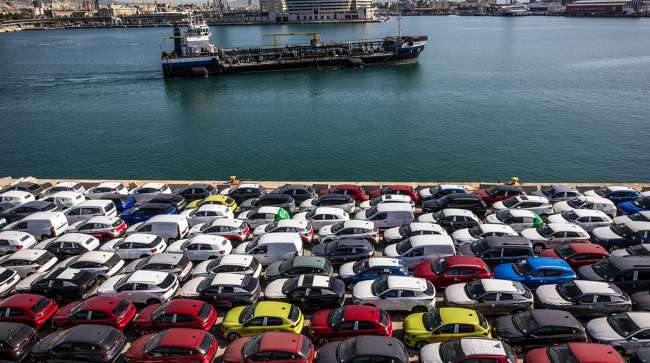Newly manufactured automobiles wrapped in protective film sit on the dockside during loading operations at the port of Barcelona in Barcelona, Spain. (Angel Garcia/Bloomberg)
President Donald Trump is readying an announcement on auto levies as soon as March 26, according to people familiar with the matter, a move that would escalate his fight with global trading partners ahead of a broader tariff push next week.
The people shared the timing of the expected announcement on condition of anonymity, to discuss plans not yet made public. One of the people, though, cautioned that the president’s plans could still shift.
Shares of General Motors Co. and Ford Motor Co. hit session lows on the news and were down less than 1% as of 11:58 a.m. in New York. Stellantis NV’s stock also turned negative, erasing earlier gains.
Trump told reporters earlier this week that he would detail the auto levies in the coming days, indicating they could come before his planned April 2 rollout of sweeping reciprocal tariffs targeting other nations. The president has said the levies will help spur growth in the domestic auto sector and force companies to move more production to the U.S.

Trump
The level and scope of the auto tariffs are not clear, including what, if any, exemptions would be included or considered. It’s also unclear if the tariffs would go into effect immediately or over time, and whether they would hit finished vehicles or also auto parts.
The levies would nonetheless mark a significant expansion of the president’s trade fight, and likely target some of the biggest automotive brands in countries including Japan, Germany and South Korea, all major U.S. trading partners. The move risks disrupting operations for North American automakers, which rely on highly integrated chains across the U.S., Mexico and Canada.
Auto tariffs could potentially target a significant swath of U.S. car and light truck imports, valued last year at more than $240 billion.
Nick Darman of Alvys discusses the evolution of transportation management systems and workflow automation, while David Bell of CloneOps.ai shares insights from the Manifest 2025 supply chain innovation conference. Tune in above or by going to RoadSigns.ttnews.com.
The move is poised to make cars more expensive for U.S. consumers already uneasy about inflation and amplify worries that Trump’s tariffs will pitch the economy into a downturn. Tariffs will likely raise prices of foreign-made cars, but even U.S.-made vehicles would see price spikes if supplies and parts are hit by levies or if supply chains are cut off from manufacturing in lower-cost countries.
Analysts have estimated that new tariffs could increase new-car prices by thousands of dollars per vehicle. One recent study found that tariffs on Canada, Mexico and China would raise the cost to produce a crossover vehicle by about $4,000 while a U.S.-made EV would jump by about $12,000.
Trump is betting that his tariff moves will remake U.S. industry and has claimed his approach is already working. Earlier this month, he hosted executives from Hyundai Motor Co. at the White House and hailed the South Korean automaker’s $21 billion U.S. expansion plan as “a clear demonstration that tariffs very strongly work.”
But Trump’s imposition of trade duties has been erratic, marked by delays and suspensions as he extracts policy concessions from trading partners. Those shifts have rattled markets and made business leaders uneasy as they face investment and hiring decisions.
Trump imposed 25% tariffs on imports from Mexico and Canada earlier in March but delayed those for a month on goods, including automobiles and parts, covered by the USMCA North American trade deal. Auto executives from Detroit’s Big Three had lobbied Trump for relief, saying they needed more time to adapt given the close integration of the sector across the continent.
The new tariffs will exacerbate their concerns, with Trump having said he would not give U.S. carmakers another reprieve. While Trump has said he wants more domestic production, that could be years away given the time it takes to build new factories and concerns about how feasible it will be for many suppliers to shift.
Leaders of Ford and Jeep maker Stellantis have urged the White House to target the roughly 4 million vehicles imported to the U.S. annually that are made without U.S. parts content.







